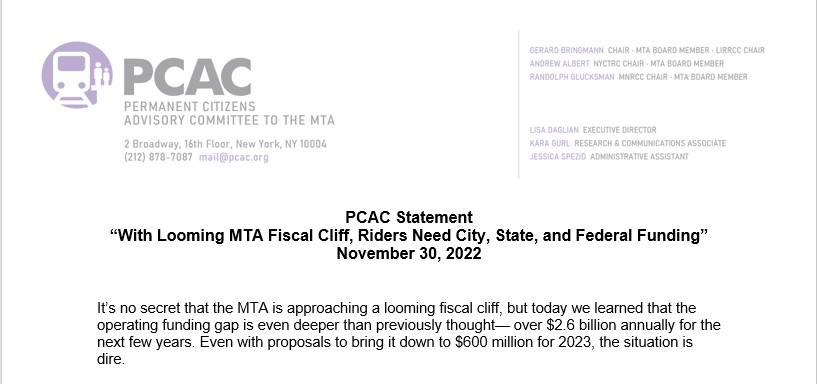It’s no secret that the MTA is approaching a looming fiscal cliff, but today we learned that the operating funding gap is even deeper than previously thought— over $2.6 billion annually for the next few years. Even with proposals to bring it down to $600 million for 2023, the situation is dire.
Internal efficiencies and cost savings laid out for filling this gap are encouraging, and we are particularly pleased to see the synergies between the LIRR and Metro-North that are coming together as the result of having the two railroads under a single leader. The use of technology and innovation to do more with less — looking internally at ways to tighten the MTA’s belt without layoffs, major fare hikes or service cuts — is an important way to show elected officials that the MTA is contributing to the solution.
But with federal COVID relief funding quickly running out, one shots, paying down debt and finding efficiencies clearly won’t be enough, as Comptroller DiNapoli found in his report released this week. Without new, dedicated operating support from the state and federal government, riders — and the entire region — will suffer.
The city, state, and federal government must work together to find new sources of long-term, dedicated funding for transit. Lower revenue caused by lower post-COVID ridership is not a problem unique to the MTA, but the MTA receives less government subsidies as a proportion of its total budget than nearly all other transit agencies in the U.S. It’s time for transit to be funded like the essential service it is—just like fire and police departments, roads, sanitation, and many other critical services.
Recurring, long-term funding sources are key to ensure that the MTA financial cliff does not become an annual crisis. The risk of not fully funding transit is that the MTA may have no choice but to cut service, raise fares, delay critical state of good repair work, or lay-off its own essential workers. Riders living paycheck-to-paycheck will pay the price if the MTA continues to lurch from crisis to crisis and be funded budget-to-budget.
We can’t let that happen.
Transit is indispensable to life in metropolitan areas – to our city and region’s way of life and economy – and it desperately needs investment from our city, state, and federal leaders. Transit is a critical driver of equity, providing access to education and jobs for millions of riders from all socioeconomic backgrounds—the very people who will bear the brunt of the fare hikes and service cuts looming if funding isn’t found. We call on Governor Hochul, the State legislature, and federal and city partners to fill the MTA’s budget gap by finding new, dedicated, ongoing funding sources for transit.
